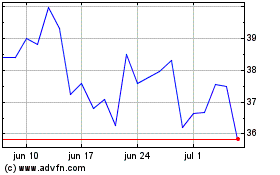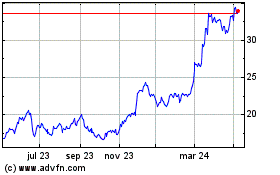Boeing Drops Embraer Deal -- WSJ
27 Abril 2020 - 2:02AM
Noticias Dow Jones
U.S. jet maker moves to save cash by aborting joint ventures
after pandemic halted travel
By Doug Cameron
This article is being republished as part of our daily
reproduction of WSJ.com articles that also appeared in the U.S.
print edition of The Wall Street Journal (April 27, 2020).
Boeing Co. said it dropped plans to take control of the jetliner
business of Brazil's Embraer SA, saving around $4 billion in
much-needed cash but adding further uncertainty to its own product
strategy.
The U.S. aerospace giant said Saturday the companies failed to
agree to final terms by the initial termination date and opted to
walk away from the two planned joint ventures announced in 2018,
which had already been delayed by some competition regulators.
Boeing had pursued Embraer to acquire access to smaller
jetliners seating around 100 passengers and engineering expertise,
but the Brazilian company's market value has fallen by two-thirds
since the start of the year as the coronavirus upended air travel
and led to the grounding of much of the global airline fleet.
The companies didn't detail what conditions weren't met. Boeing
doesn't expect to have to pay a break fee -- which varied from $75
million to $100 million in the original contract -- according to
people familiar with the situation.
"We all aimed to resolve those by the initial termination date,
but it didn't happen," said Marc Allen, who headed Boeing's team on
Embraer integration.
Embraer said Boeing had wrongfully terminated the agreement and
used false claims as a pretext to avoid its commitments to close
the transaction. The Brazilian company said that it intends to use
all remedies available regarding the damages incurred by Embraer
because of Boeing's decision.
"We believe Boeing has engaged in a systematic pattern of delay
and repeated violations of the [purchase agreement], because of its
unwillingness to complete the transaction in light of its own
financial condition and 737 MAX and other business and reputational
problems."
Boeing had agreed to pay $4.2 billion in cash for an 80% stake
in Embraer's commercial business, which focused on small regional
jetliners, as well as a 49% stake in a unit producing a new
military cargo jet. Boeing said it still wanted to continue a joint
marketing deal involving Embraer's military cargo jet.
"Boeing argues in its statement that the withdrawal occurred due
to unsatisfactory conditions in the final negotiations, but our
view is that the economic crisis that is starting globally could
hurt companies in the sector and retaining liquidity is the most
sensible path at the moment," said Pedro Galdi, an analyst at São
Paulo-based brokerage Mirae Asset.
The U.S. company last year raised funds for a deal it had hoped
to close by the end of 2019, only for European antitrust regulators
to voice objections. Their probe wasn't due to conclude until
August.
Boeing had redirected the funds from last year's bond issue and
has been raising more funding to address the liquidity squeeze from
the grounding of the 737 MAX and the collapse in air travel, which
has left airlines unable or unwilling to take new aircraft.
Rival Airbus SE moved into the small-jetliner business by
acquiring an aircraft program from Canada's Bombardier Inc.
Boeing's aircraft-development program had already been derailed
by the prolonged grounding of the MAX, following two fatal
accidents. Boeing also shelved plans for a new midsize jet to focus
on returning the MAX to commercial service.
--Jeffrey T. Lewis contributed to this article.
Write to Doug Cameron at doug.cameron@wsj.com
(END) Dow Jones Newswires
April 27, 2020 02:47 ET (06:47 GMT)
Copyright (c) 2020 Dow Jones & Company, Inc.
EMBRAER ON (BOV:EMBR3)
Gráfica de Acción Histórica
De Mar 2024 a Abr 2024

EMBRAER ON (BOV:EMBR3)
Gráfica de Acción Histórica
De Abr 2023 a Abr 2024
